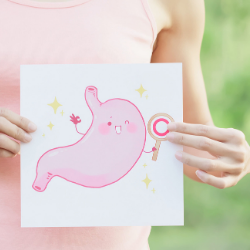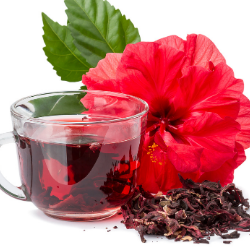7 Health Benefits of Tea For PCOS

Finding a PCOS-friendly beverage isn’t easy, as most are packed with sugar or artificial sweeteners. And plain old water gets boring. My favorite drink for PCOS is tea! It’s packed with health benefits ranging from lowering androgens to decreasing the risk of heart disease. And the best part is that there are so many different types and flavors of tea to choose from! Read nutrition student Lydia Chen’s blog post to learn more about the health benefits of tea for PCOS. I think you’ll want to have a “cuppa tea” after reading this!
What Is In Tea?
Tea is categorized into three groups based on different processing methods and types of leaves: black (fermented), green (non-fermented), and oolong (semi-fermented). Tea contains some healthy compounds that are naturally present in tea leaves. Some of the main components of tea include:
- Polyphenols
The health benefits of tea come mainly from polyphenols, natural substances found in plants. Approximately 30-42% of the weight of dry tea plant’s leaves are composed of polyphenols, mainly flavonoids, which are natural antioxidants. Within the flavonoid group, flavonols, also known as tannins or catechins, are the most abundant ones. The most prevalent flavonols in tea are catechin (C), epicatechin (EC), epicatechin gallate (ECG), gallocatechin (GC), epigallocatechin (EGC), and epigallocatechin gallate (EGCG). - Caffeine
In white, green, and black teas, the concentration of caffeine ranged from 14-61 mg with a serving of 6-8 oz (one serving) of tea. Compare this to an 8 oz cup of typical coffee that has 80-100 mg caffeine. The decaffeinated teas have less than 12 mg of caffeine in one serving of tea. Herbal teas do not contain caffeine. - Minerals & Vitamins
While tea doesn’t contain a significant amount of minerals or vitamins, it contains small amounts of magnesium, potassium, fluoride, vitamin C, thiamin (B1), beta carotene, and folate. - Amino Acids
While tea contains negligible amounts of protein, it does contain an amino acid called L-Theanine, which has beneficial effects on reducing stress and improving cognitive functions.
Health Benefits of Tea for PCOS
 What I love about tea is that it has many health benefits that are so important for PCOS.
What I love about tea is that it has many health benefits that are so important for PCOS.
- Act as antioxidants
People with PCOS have been shown to have higher rates of oxidative stress as compared to those without PCOS. Antioxidants help to neutralize the harmful free radicals that are created with oxidative stress. Studies have shown that consumption of 300 ml (2 g tea solid adding in 300 ml water) green tea or black tea improved the antioxidant activity in participants’ blood. Specifically, antioxidant activity was 1.5 times higher after green tea was consumed compared to the consumption of black tea. - Improve insulin activity
Insulin resistance is a major driver for most people with PCOS. This meta-analysis of 17 randomized controlled trials suggests tea decreased fasting blood sugar, HbA1cas well as fasting insulin. Another
study also showed green tea decreased insulin levels. Read my blog post on how to lower insulin resistance naturally. - Weight loss
Up to 70% of people with PCOS are overweight or obese. Tea may play a small role in aiding with weight loss. This double-blind randomized controlled 12-week study looked at the effect of green tea on weight loss in PCOS. The group that received the green tea (in the form of 500 mg capsules 2 times a day) lost 5% of their body weight, compared to the control group that did not lose weight. - Gut health

There tends to be an altered gut microbiome in PCOS. Studies are even suggesting the gut microbiome may play a role in causing PCOS. While we don’t know what the ideal microbiome is, we know that diet can play a major role in keeping it healthy. And drinking tea might help. Green tea and black tea are rich in polyphenols. Studies have found that polyphenols could decrease the growth of “bad” bacteria and promote the growth of “good” bacteria. microbiota. (reference) - Improved cholesterol level
People with PCOS tend to have lower HDL (good cholesterol), and higher levels of triglycerides (TG) and LDL (“bad” cholesterol). In addition, there is an increased risk of heart disease. The good news is that tea may improve all of these. The study monitored over 80000 participants for 6 years on their tea consumption to find out the association between tea drinking and HDL-C concentration. It found that those who consumed tea regularly had a reduced age-related decrease in HDL-C, and TG/HDL‐C and TC/HDL‐C ratios were slowly increasing. That decline of age-related decrease in HDL-C was associated with an 8% lowered risk of CVD. Green and black teas were the most effective teas and other teas such as herbal or flowering teas appeared to have little impact on HDL‐C. The randomized double-blind crossover study that involved adults who had mild hypercholesterolemia found that drinking five servings of black tea per day for three weeks resulted in reduced total cholesterol by 6.5% and LDL-c by 11.1% compared to those given a caffeinated placebo. - Lowering androgens
 Since androgen excess is at the heart of PCOS, this is an exciting benefit of tea. Studies have shown that specific types of tea, namely spearmint and green tea, may lower androgens.
Since androgen excess is at the heart of PCOS, this is an exciting benefit of tea. Studies have shown that specific types of tea, namely spearmint and green tea, may lower androgens. - Decreased stress
If you have PCOS, you may feel that stress is your middle name. Stress can have a big-time impact on worsening your symptoms of PCOS. Sit down and have a cup of tea! In one study, after the completion of stressful tasks, participants who consumed tea prior had lowered cortisol levels and the difference was most significant at 50 minutes post-task. - Anti-cancer
And while this one is not specific to PCOS, studies are also suggesting tea may help decrease the risk of cancer. Some studies suggest that two flavonols–epigallocatechin-3-gallate mainly in green tea and theaflavin-3,3′-digallate in black tea–are the most effective anti-cancer compounds in te
Top 10 Teas for PCOS
Here comes the fun part – variety!
 Peppermint tea – Has calming effects and is beneficial because of its antibacterial, antioxidant properties, and may help with digestive upsets. (reference)
Peppermint tea – Has calming effects and is beneficial because of its antibacterial, antioxidant properties, and may help with digestive upsets. (reference)
Spearmint tea – May provide anti-androgen effects among women with PCOS and help reduce hirsutism. (reference)
Ginger tea – Abundant in phenolic compounds, such as gingerols, shogaols, and paradols, which have anti-carcinogenic, antibacterial, and anti-inflammatory health benefits. It may help lower the risk of some chronic diseases, such as hypertension and chronic heart disease. (reference)
Green tea – Rich in anti-inflammatory antioxidants, and has effect on lowering fasting insulin and free testosterone level. (reference)
 Black tea – Has anti-inflammatory properties, may improve gut health and cholesterol profile.
Black tea – Has anti-inflammatory properties, may improve gut health and cholesterol profile.
Turmeric tea – Turmeric contains curcumin, an active ingredient that has anti inflammatory properties and has beneficial effects on arthritis and metabolic syndromes. (reference)
Cinnamon tea – Cinnamon may reduce insulin resistance. It also is rich in antioxidants and can regulate menstruation. (reference)
Chamomile tea – A “calming” tea that contains an antioxidant called apigenin. It may have a calming effect, helping you sleep. (reference)
Tulsi tea – Promotes the release of antioxidant compounds, prevents cancer. and protects against physical and metabolic stress. (reference)
 Hibiscus tea – Contains antioxidants and has a positive influence on lipid profile, including a decrease in total cholesterol and LDL-C, and an increase in HDL-C. (reference)
Hibiscus tea – Contains antioxidants and has a positive influence on lipid profile, including a decrease in total cholesterol and LDL-C, and an increase in HDL-C. (reference)
Bottom line
Tea is one of my favorite beverages for PCOS. You drink them hot or iced. Not only does it keep you hydrated, but it packs in a ton of health benefits for PCOS. Aim to get in 2-3 cups a day to get the most health benefits. And with all the flavors of tea, you’ll never get bored!
I’d like to thank Lydia Chen for writing this blog post.  Lydia is currently a senior at New York University majoring in Nutrition & Dietetics. She is an eager learner and is passionate about sharing comprehensive and interesting nutrition information with others. She enjoys shopping at Trader Joe’s and loves trying new food. As a tea lover, A cup of black, oolong, or pu’er tea is enough for her to refresh!
Lydia is currently a senior at New York University majoring in Nutrition & Dietetics. She is an eager learner and is passionate about sharing comprehensive and interesting nutrition information with others. She enjoys shopping at Trader Joe’s and loves trying new food. As a tea lover, A cup of black, oolong, or pu’er tea is enough for her to refresh!
What is your favorite tea?
RELATED POSTS
MEET MARTHA
I especially love problem-solving, whether it’s helping women defeat issues plaguing them for years, helping a busy executive find practical ways to get heart healthy, or providing tips to help you reverse diabetes. That’s why I’m on a constant quest to expand my knowledge by staying on top of the latest research.

20 Ways To Eat Out 550 Calories or Less!
No time to cook? We’ve got you covered. Here are 20 healthy meals from a variety of cuisines that won’t pack on the pounds. Most of them also have less than 30 grams of carbs.
Subscribe to my newsletter and get this free download.




